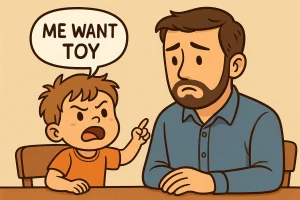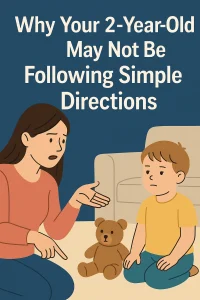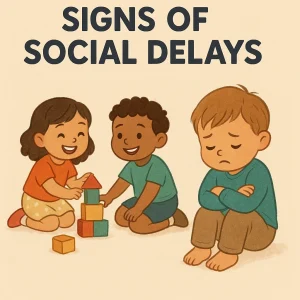Autism Screening 101: A Parent’s Essential Guide
Last Updated: September 27, 2024
As a parent, you know your child better than anyone else. You notice their every smile, sound, and step, and those little moments bring endless joy. But what if you sense something different—perhaps a developmental delay or social disconnect? This is where autism screening plays a crucial role. Autism Spectrum Disorder (ASD) often presents itself early in childhood, and early screening can be the key to better support and brighter outcomes.
Why is early screening so important? Imagine catching a small spark before it becomes a wildfire—early detection of autism provides an opportunity to address challenges early on. Research shows that early intervention can significantly improve communication, behavior, and learning skills in children with autism. By identifying signs early, you can take steps to support your child’s growth and development, which can make a world of difference as they progress through life.
Why Screen Early?
The Benefits of Early Autism Screening
You might be wondering, “Why does it matter if my child is screened early for autism?” The answer is simple: early autism screening can be life-changing for both you and your child. Just like noticing a child’s first steps or words, recognizing early signs of autism opens the door to timely support, early intervention, and better outcomes for your child’s growth and development.
Children with autism spectrum disorder (ASD) benefit most when support starts early. Research has shown that identifying signs of autism as early as possible can lead to more effective interventions, whether it’s speech therapy, behavioral therapy, or social skills development. These interventions can help your child learn new skills, communicate more effectively, and develop meaningful social connections.
Think of early autism screening as the first step in a journey to understand your child better, providing them with the best opportunities to grow and thrive. By catching these signs early, you can work with healthcare providers to develop a tailored plan that fits your child’s unique needs. It’s not about labeling your child; it’s about empowering them with the right tools and resources for a brighter future.
Also Read: The Role of Autism Screening Tests in Early Childhood Intervention
Developmental Milestones to Look For
Now, how do you know if autism screening is needed? Start by observing your child’s developmental milestones. Every child grows at their own pace, but there are some general indicators that can help you recognize potential developmental delays.
Here are a few milestones to keep an eye on:
- Eye Contact & Social Interaction: Does your child make eye contact when speaking or responding to others? Babies typically start showing social smiles by 6 months and respond to their name by 12 months. A lack of response or interest in social interaction can be an early sign to consider.
- Language & Communication Skills: By 12 to 18 months, most children start to babble, say a few words, and use gestures like pointing or waving. If your child is not meeting these communication milestones, it might be worth discussing with your pediatrician.
- Play & Interests: Observe how your child plays. Do they use toys in creative ways, or is their play repetitive and limited in imagination? Repetitive behaviors, like hand-flapping or lining up toys, can be signs of autism.
- Behavioral Patterns & Routines: Children with autism often have strong preferences for routines and may struggle with changes. If your child becomes upset when their routine is interrupted or shows extreme sensitivity to sounds, textures, or lights, it’s another potential indicator.
Developmental Milestones by Age
| Age | Communication | Social Interaction | Play & Behavior |
| 6 Months | – Turns head toward sounds. – Cooing and gurgling sounds. – Laughs and squeals. | – Makes eye contact. – Smiles when spoken to. – Mimics simple facial movements. | – Explores toys with hands and mouth. – Shows curiosity. – Reaches for objects. |
| 12 Months | – Waves “bye-bye” or points. – Says basic words like “mama” or “dada.” – Babbles with different tones. | – Responds to their name. – Reaches for objects to show interest. – Prefers familiar people. | – Plays peek-a-boo and pat-a-cake. – Shakes and throws toys. – Imitates actions like clapping hands. |
| 18 Months | – Says single words like “ball” or “milk.” – Points to objects when named. – Repeats words they hear. | – Points to show interest. – Hugs or kisses familiar people. – Engages in pretend play, like feeding a doll. | – Imitates adult actions (e.g., talking on phone). – Plays near other children (parallel play). – May have temper tantrums. |
| 24 Months | – Combines 2-4 words in phrases (“more juice”). – Follows simple instructions. – Names familiar people or objects. | – Plays simple games (hide-and-seek). – Understands “mine” and “yours.” – Shows empathy (comforts others). | – Pretends to cook or care for toys. – Sorts shapes and colors. – Plays with toys in different ways (stacking, drawing). |
Key Signs of Autism in Children
Early Signs to Watch For
As you continue to learn about autism screening, understanding the early signs can help you take action when it matters most. Autism can look different in each child, but there are a few common signs that might raise a flag for parents and caregivers.
- Lack of Eye Contact & Social Engagement
Most babies will make eye contact when someone speaks to them or even when they’re feeding. If your child avoids eye contact or rarely smiles back when you smile at them, this may be an early indicator. Social cues, like responding to their name, may also be delayed or absent in children with autism. - Delayed Speech or Limited Language Skills
Around the age of 12 months, children generally start babbling or saying their first words. If your child isn’t using language to express needs or isn’t babbling at all by 16 months, it could be a sign. Additionally, if your child uses very few gestures, like pointing or waving, or seems to struggle with basic communication, it’s worth discussing with your pediatrician. - Limited Social Interaction
Children on the autism spectrum may show less interest in playing with others, sharing interests, or engaging in imaginative play. If your child tends to play alone, doesn’t try to get your attention by showing or bringing things to you, or doesn’t imitate simple actions like clapping, these could be early signs of autism.
Read more: 5 Early Signs of Autism Every Parent Should Know
Behavioral Signs to Recognize
Beyond social cues and language, there are certain behavioral patterns that are more commonly seen in children with autism. Understanding these can help you notice if your child might need further support.
- Repetitive Behaviors & Movements
Does your child repeatedly flap their hands, rock their body, or spin objects? Repetitive behaviors, also known as “stimming,” can be a way for children with autism to self-soothe or cope with sensory input. While stimming itself isn’t harmful, it can be an early sign that your child is on the spectrum. - Strong Need for Routine & Order
Children with autism often find comfort in routines and can become distressed when their daily schedule is interrupted. They may insist on certain rituals, like following the same route to school every day or lining up toys in a particular order. While many children enjoy routines, an unusually strong dependence on them may be a sign of autism. - Sensitivity to Sensory Experiences
You may notice that your child reacts strongly to certain sounds, lights, or textures. For example, some children with autism might cover their ears at a loud noise, be bothered by clothing textures, or be highly sensitive to smells. These sensory sensitivities can lead to either an overreaction or lack of reaction to sensory input.
Common Autism Screening Tools
Autism screening tools help detect signs of autism and developmental delays early on. They are used by both healthcare professionals and parents to track a child’s development and provide insights for timely intervention. Here are some commonly used tools:
BASICS Early Autism Screener (BEAS)
BEAS is a tool offered by Wellness Hub to assess a child’s social, communication, and behavioral development. It helps parents identify early signs of autism, making it easier to start intervention as soon as possible.
Ages and Stages Questionnaires (ASQ)
The ASQ is simple and takes 10-15 minutes to complete. It helps track a child’s milestones in communication, motor skills, problem-solving, and social interactions. Parents can use it to see if their child might need further evaluation.
Screening Tool for Autism in Toddlers (STAT)
Designed for children aged 24-36 months, STAT is an interactive, play-based screening tool. It includes 12 activities to observe how a child communicates, imitates, and plays, providing an effective way to detect autism early on.
Social Communication Questionnaire (SCQ)
The SCQ is for children aged 4 and up. It consists of 40 yes-or-no questions that focus on a child’s social and communication skills, helping parents quickly identify if further evaluations are needed.
What If Screening Shows a Concern?
Next Steps for Parents
If an autism screening indicates potential concerns, it’s natural to have mixed feelings. On one hand, you might feel relieved to be taking action, while on the other, you may have questions and even anxiety about what comes next. Remember, you’re not alone, and this is the time to seek more specialized support for your child’s development.
The screening results don’t confirm a diagnosis; they simply suggest that further evaluation is needed. This is where specialists come in. If your child’s pediatrician or family doctor sees signs of autism based on the screening, they may refer you to experts who are more experienced in diagnosing autism. These specialists could include:
- Developmental Pediatricians – Doctors who specialize in child development.
- Child Psychologists or Psychiatrists – Mental health experts who understand developmental disorders.
- Neurologists – Specialists in the brain and nervous system, who can rule out other potential conditions.
These professionals will provide a more in-depth look into your child’s development, helping to confirm whether your child is on the autism spectrum.
What to Expect in Diagnosis
Getting an official diagnosis is a detailed process, but it helps in understanding your child’s unique needs and setting the right support plan in motion. Here’s what you can generally expect:
- Comprehensive Observations: Specialists will observe your child’s behavior and interactions over time. They may assess how your child communicates, plays, and responds to different situations. Sometimes, they may also engage your child in specific activities to see how they react and interact.
- Parent Interviews & Questionnaires: You, as the parent, play a crucial role in the diagnosis process. Specialists will ask you about your child’s development, everyday behaviors, and any signs you’ve noticed. They may also give you detailed questionnaires to help gather as much information as possible about your child’s skills and challenges.
- Standardized Diagnostic Tools: To ensure accuracy, specialists use various tools and tests, such as the Autism Diagnostic Observation Schedule (ADOS) or the Autism Diagnostic Interview (ADI), which help assess social skills, language development, and behavior.
- Possible Additional Tests: In some cases, specialists might recommend additional evaluations, like hearing and vision tests, to rule out other conditions that could affect your child’s development. This is especially true if certain behaviors could be linked to sensory issues or other medical conditions.
Taking Action After the Diagnosis
If your child is diagnosed with autism, it’s important to remember that this is the beginning of a journey, not the end. Early intervention and consistent support can help your child develop key skills and lead a fulfilling life. To explore therapy options and learn more about supporting your child post-diagnosis, you may find it helpful to connect with resources like those offered by Wellness Hub, where professional support and guidance are available to help your child reach their potential.
How to Prepare for Autism Screening
Getting ready for an autism screening can feel overwhelming, but preparation helps make the process smoother and more insightful. Here are some practical steps to take as you prepare to better understand your child’s development and seek the right support.
Track Your Child’s Development
As a parent, you’re often the first to notice when something feels “off.” Trust your instincts, and make it a habit to jot down any behaviors or delays that stand out. Keeping a log of your child’s milestones and activities helps you spot patterns or issues that may need further attention.
Some things to observe and record might include:
- Communication Skills: How does your child communicate their needs? Are they babbling, using gestures, or forming words? Take note of any delays or gaps in speech and non-verbal communication.
- Social Interactions: Does your child respond to their name, make eye contact, or smile back when you smile? Observing their interactions with family members and other children can help identify any signs of limited social engagement.
- Repetitive Behaviors or Unusual Reactions: Does your child flap their hands, rock back and forth, or show a strong preference for routines? These behaviors, while not necessarily a problem on their own, can be early indicators of autism.
Common Myths About Autism Screening
When it comes to autism screening, there are a lot of myths and misconceptions that can make the process feel confusing or intimidating. Clearing up these myths helps you approach the screening with the right mindset, so let’s break down some of the most common ones.
Myth 1: “Screening Means Diagnosis”
One of the biggest misunderstandings about autism screening is that it is the same as diagnosing autism. But here’s the truth: screening is simply a first step. It’s a way to identify children who might be at risk for autism and who may need further evaluation. Just because a screening indicates that your child could have signs of autism does not mean they will receive an autism diagnosis.
Think of screening like a temperature check—it helps you know when something needs to be looked at more closely, but it’s not the final word. A full diagnosis involves a comprehensive evaluation by specialists, and it considers multiple factors, such as behavior, developmental history, and more.
Myth 2: “Only Certain Children Need Screening”
It’s easy to think that autism screening is only necessary if your child is showing very obvious signs of developmental delays, but the reality is different. Autism can sometimes present itself subtly and may not always be immediately noticeable. Screening is recommended for all children, not just those who seem to have significant differences in behavior or development.
In fact, most pediatricians perform routine developmental screenings at regular checkups (typically at 18 and 24 months) to catch any potential concerns early. If autism is caught sooner, parents can start providing their child with support and intervention as early as possible. The earlier, the better, and that applies to all children.
Myth 3: “Screening Can Wait Until School Age”
Some parents assume that autism screenings aren’t necessary until a child starts school or socializes with other kids. However, screening is most effective when done as early as possible, ideally before the age of 2. Early screening helps identify developmental issues that may not become apparent until later, allowing for timely intervention.
Remember, the goal of screening is to set your child up for success, and waiting until school age can mean missed opportunities to support your child’s development during those critical early years.
Myth 4: “Autism Screening Labels a Child for Life”
It’s natural to worry that a screening or diagnosis will label your child in a way that defines them. However, screening does not define who your child is; rather, it helps you better understand their unique needs and how best to support them. Knowing what your child needs allows you to seek appropriate therapies, resources, and interventions that help them grow and thrive.
Remember, having an early diagnosis doesn’t limit a child’s potential—it provides a path to the right support. With access to therapies like speech, occupational, or behavioral therapy, many children with autism can make great strides in their development.
Myth 5: “My Child Doesn’t Show Any Signs, So There’s No Need to Screen”
While your child may not exhibit visible signs of autism, it’s important to note that autism presents differently in every child. Some children might show social challenges, while others may display repetitive behaviors. And in some cases, signs of autism may be very subtle.
Routine screening helps ensure that any potential developmental issues are identified, even if they’re not immediately obvious. It’s always better to screen and be sure than to miss out on the benefits of early intervention.
Conclusion
If you’ve read this far, you’re already taking a great step toward understanding your child’s development. Autism screening is not about labels—it’s about finding ways to support your child in the best possible way. By spotting any signs early, you open up opportunities for your child to grow and learn in their own unique way. Early screening gives you a chance to provide the right help, whether that means improving communication, social skills, or behavior. And remember, as a parent, you know your child best, and taking action now can make a big difference.
Screening is a positive step, and it’s never too early to start. Whether or not your child has autism, understanding their development is key to being their best advocate. If you need guidance or support, you can always explore resources, like those at Wellness Hub, to help you navigate the journey. Every child is unique, and by taking early action, you’re ensuring they have every opportunity to thrive and reach their full potential.
Frequently Asked Questions:
1. What is autism screening?
Autism screening is a process used to identify children who may be at risk for Autism Spectrum Disorder (ASD). It usually involves answering a series of questions or completing a checklist about your child’s behavior, development, and social skills.
2. At what age should my child be screened for autism?
Children are typically screened for autism at 18 and 24 months, during regular pediatric visits. However, if you notice developmental delays or unusual behaviors, you can ask your pediatrician to screen your child at any age.
3. What are the early signs of autism that parents should look out for?
Early signs of autism can include lack of eye contact, delayed speech or communication skills, repetitive behaviors, limited social interactions, and a strong preference for routine. If you notice any of these signs, consider speaking with your pediatrician about screening.
4. Does screening for autism mean my child will be diagnosed with autism?
No, screening is just the first step to identify if your child may be at risk for autism. It does not confirm a diagnosis. A positive screening result means your child may need further evaluation by a specialist.
5. How accurate is autism screening?
Autism screenings are designed to be sensitive to early signs of autism but are not 100% accurate. They are intended to identify children who may benefit from further evaluation, not to diagnose autism directly.
6. Can a child be screened for autism more than once?
Yes, it is common for children to be screened more than once, especially during their early years. Developmental milestones are monitored over time, and if new concerns arise, additional screenings can be conducted.
7. What should I do if I have concerns about my child’s development?
If you have concerns about your child’s development, behavior, or communication, it’s important to talk to your pediatrician. They can guide you on the next steps, including screening and, if necessary, referral to a specialist for a comprehensive evaluation.
8. What happens if my child “fails” an autism screening?
If a screening indicates your child is at risk for autism, the next step is to get a full evaluation by a developmental pediatrician or specialist. This evaluation will provide a clearer understanding of your child’s needs and determine if a diagnosis is necessary.
9. How can I prepare my child for an autism screening?
To prepare for an autism screening, it’s helpful to track your child’s development and behaviors. Take notes on any concerns or delays you notice, and bring this information to your doctor’s visit to discuss with them.
10. Is early autism screening really important?
Yes, early autism screening is crucial as it helps identify any developmental delays early on, allowing for timely intervention and support. Early action can lead to better outcomes for your child’s social, communication, and learning skills.
About the Author:
Anuradha Karanam
Speech-language pathologist (7+ years of experience)
Anuradha Karanam is a skilled speech-language pathologist with over 6 years of experience. Fluent in Tamil, Telugu, Hindi, and English, she specializes in parent counseling, speech sound disorders, fluency assessment, and speech-language evaluations. Anuradha excels at working with children with developmental disorders, offering creative and effective therapy programs. Currently, at Wellness Hub, she holds a BASLP degree and is registered with the RCI (CRR No A85500). Her patience, ambition, and dedication make her a trusted expert in her field.
Book your Free Consultation Today
Parent/Caregiver Info:
Client’s Details:
* Error Message









